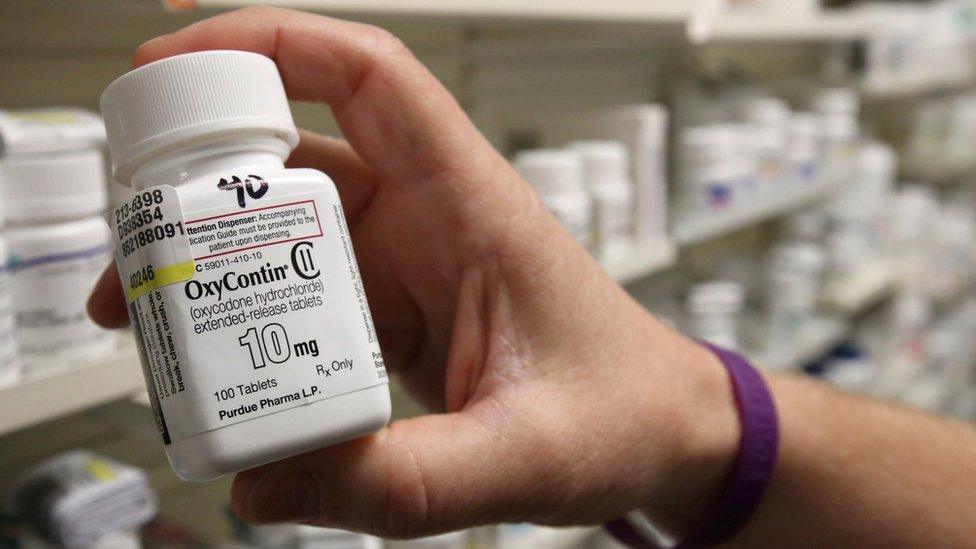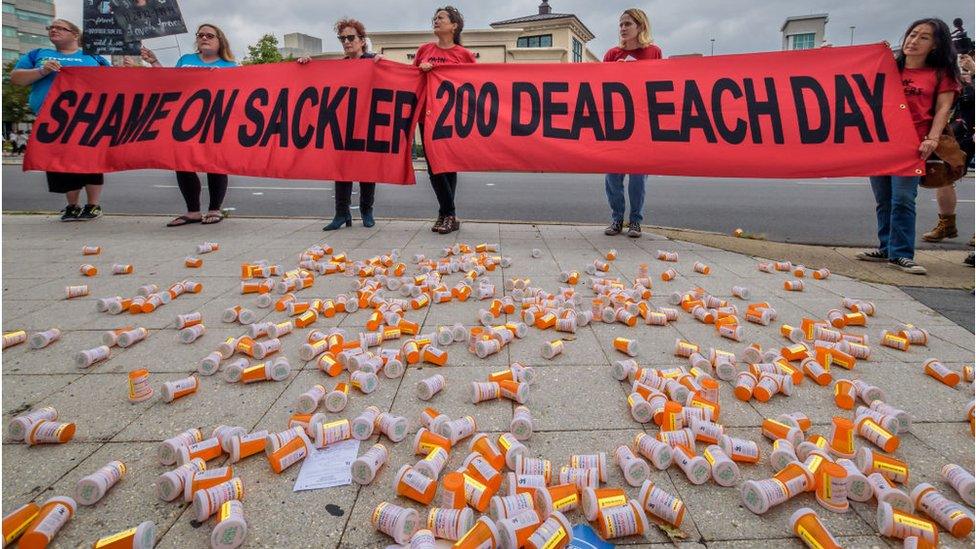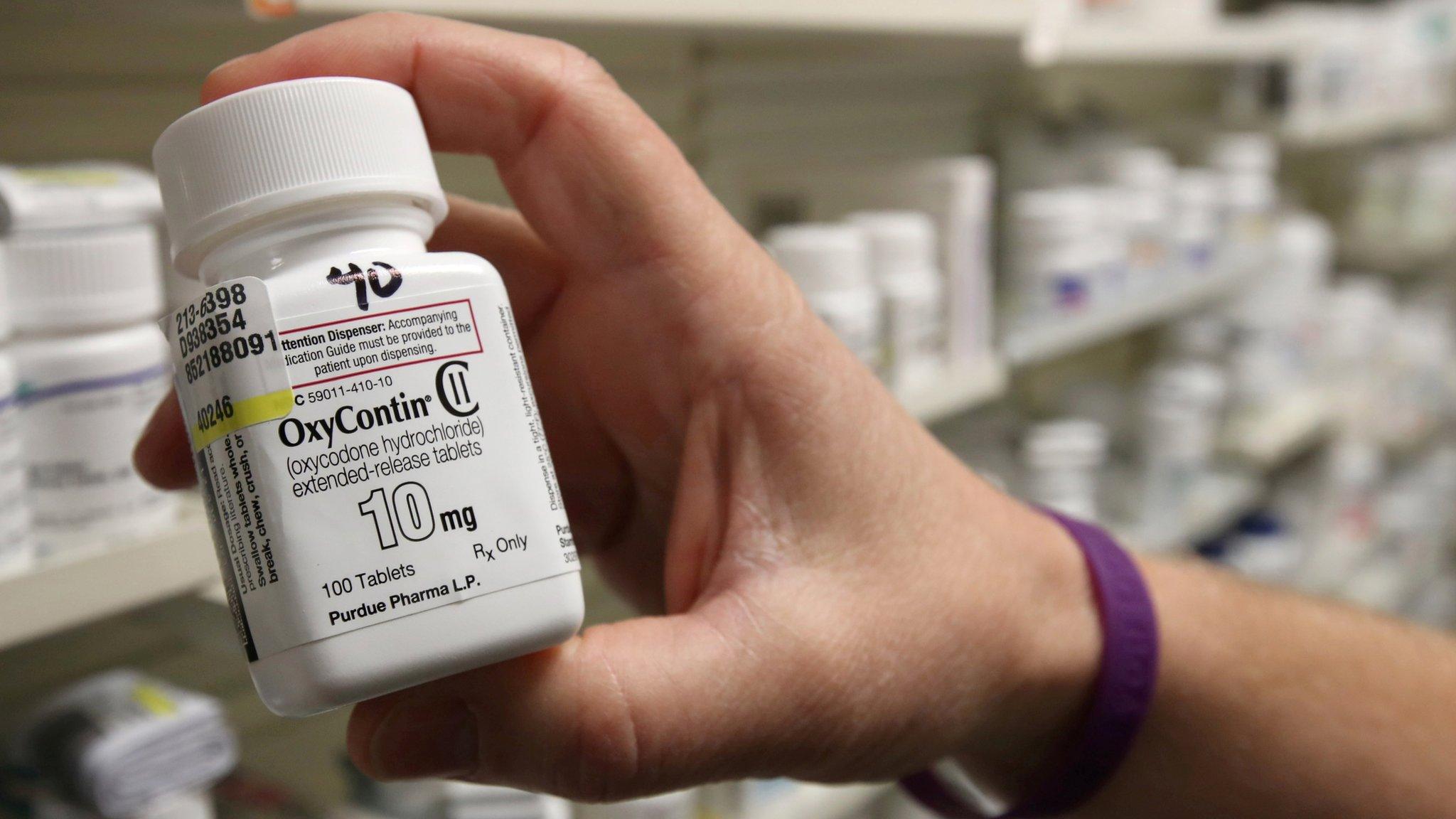Sackler family wins immunity from further opioid litigation
- Published

Oxycontin has been widely abused
A US judge has approved a bankruptcy plan for the maker of OxyContin painkillers, shielding its wealthy owners the Sacklers from further legal action over their roles in America's opioid epidemic.
Under the deal, Purdue Pharma agreed to pay $4.5bn (£3.3bn) to settle lawsuits related to the crisis.
Sackler family members will also give up control of the drugmaker.
But they also have immunity from future lawsuits, despite strong opposition.
Nearly all US states, hospitals, native American tribes and other creditors approved the settlement, although some states said they would appeal.
Judge Robert Drain noted that the Sackler family members who testified showed little remorse. "A forced apology is not really an apology," he said. "And so we will live without one."
In 2020, Purdue pled guilty to criminal charges over its marketing of Oxycontin, a painkiller it knew was addictive and being widely abused.
Those charges included defrauding health agencies and making illegal payments to doctors to encourage the over-prescription of opioids, leading to overdoses and addiction which strained public health and policing resources in cities and towns across the US.

Campaigners outside Purdue Pharma headquarters in Stamford in 2019
However, the Sackler family members who ran the business have always denied any personal responsibility for the crisis, which has affected millions of people over the last 20 years.
The executives, who have faced around 3,000 lawsuits, say they always acted ethically and lawfully while serving on Purdue's board.
Under the bankruptcy plan, they will pay $4.5bn over a decade towards settling the outstanding legal cases against them.
Purdue Pharma will also be dissolved and its assets shifted to a new company not controlled by Sackler family members. The new firm will instead be owned by a trust run to combat the opioid epidemic.
'Bitter result'
Judge Drain said he had expected the Sacklers to make a larger contribution and that with litigation, it might have been achieved.
"This is a bitter result," he told reporters, but vowed not to jeopardise what had been agreed.
The Sacklers had vowed to reject the settlement unless they were protected from future legal action, drawing fierce opposition from some states.
Despite this, 95% of those voting on the plan approved it, although some state attorney generals opposed it.
Allow X content?
This article contains content provided by X. We ask for your permission before anything is loaded, as they may be using cookies and other technologies. You may want to read X’s cookie policy, external and privacy policy, external before accepting. To view this content choose ‘accept and continue’.
Washington State's Bob Ferguson said his office would appeal, adding: "This order is insulting to victims of the opioid epidemic who had no voice in these proceedings."
Connecticut's William Tong will also appeal, while Maryland's Brian Frosh expressed his disappointment.
"In our view, the Sacklers are responsible for extensive harm in Maryland and nationwide," Mr Frosh said in a statement before the ruling.
"This plan allows the Sacklers to enjoy riches amounting to billions of dollars."
Purdue filed for bankruptcy in 2019, promising to restructure its business to focus on tackling addiction.
Opioids are a class of powerful drugs, fully or partially synthesised from the opium poppy. They can be found as legal prescription medications, but they can also be found as illegal street drugs, such as heroin.
Addiction to both legal and illegal opioids has been a serious, ongoing problem in the US, which had nearly half a million deaths from overdoses between 1999 and 2019, according to the US Centers for Disease Control and Prevention (CDC).
- Published8 July 2021

- Published21 October 2020
